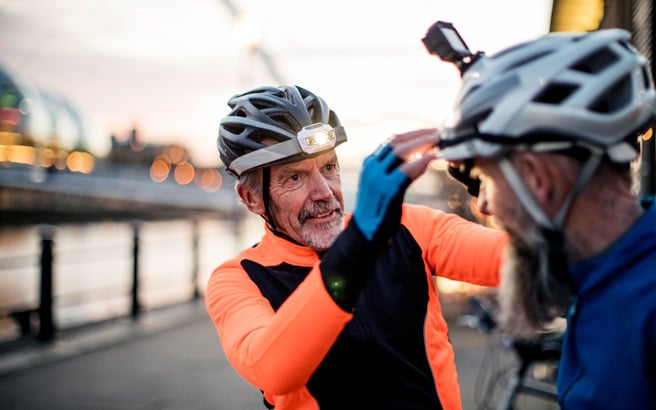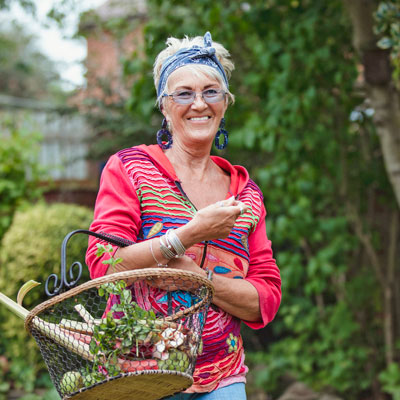 Karen Collins, MS, RDN, CDN, FAND is a Nutrition Advisor at the American Institute of Cancer Research (AICR), our partner charity in the US. Karen is a speaker, writer and consultant who specialises in helping people make sense of nutrition news.
Karen Collins, MS, RDN, CDN, FAND is a Nutrition Advisor at the American Institute of Cancer Research (AICR), our partner charity in the US. Karen is a speaker, writer and consultant who specialises in helping people make sense of nutrition news.
Talking about cancer is tough! And one thing that I’ve learned as a health professional is that the words we use matter. One word that has become contentious, especially among some cancer survivors, is “prevention”. Prevention can mean different things in different contexts and when we are talking about cancer, it is easy for the medical and research meaning of prevention to be misunderstood/misinterpreted.
What does prevention mean … and to whom?
When you talk about preventing something, what do you mean? If you check a general dictionary, you’ll see prevention defined as: “the act of hindering or keeping something from happening.” But the definition of prevention typically found in medical dictionaries and used by medical/public health agencies (eg the National Cancer Institute) is: “[In medicine] action taken to decrease the chance of getting a disease or condition.” So, in everyday use, prevention typically implies that an outcome can be stopped. But in medicine and research, it more often means reducing the risk of an outcome.
There is lots of advice – and even laws – to try to keep us safe and reduce risks.
- Seatbelts certainly save lives. But they don’t stop accidents, and fatalities still occur.
- Wearing a helmet on a bicycle or motorcycle reduces the risk of serious injury, but can’t eliminate it.
- Brushing our teeth removes harmful plaque on teeth and helps keep gums healthy, but it can’t guarantee avoiding cavities or gum disease.
In these and many other cases, although we may think of prevention as eliminating risk, subconsciously we know that we can only reduce risk of some undesirable thing happening.
Why is talking about cancer different?
Cancer is scary, and it touches us emotionally.
Cancer is also common, so when we talk about cancer, millions of people have some personal connection to it. There’s a strong chance that you or someone you love has had cancer.
- Every year, in the UK, around 400 people die from drowning as a result of an accident in or around water. (Rospa)
- 1,850 people die on UK roads each year (2012–19 average, Brake)
- In the UK in 2017, there were 165,267 cancer deaths (World Cancer Research Fund compiled from regional government data)
Consequently, when an easily misunderstood word like prevention converges with a highly emotional subject, it is natural that misunderstanding can lead to negative reactions such as a perception of “victim blaming”.
A common example occurs with lung cancer. Yes, a large proportion of lung cancer occurs in people who smoke. And avoiding tobacco greatly reduces risk. But lung cancer does occur in people who do not smoke. And there’s no guarantee that someone who smokes would not have got lung cancer if they did not smoke.
Public awareness is growing about other risk factors for cancer, such as sedentary lifestyles, excess body fat, and poor-quality diets. The bright side of this awareness is that it can help people identify ways to reduce the chance of something they want to avoid. But it’s possible that on the flip side, this awareness could turn into more ways to blame people (or yourself) for a cancer diagnosis.
Whether real or perceived, victim blaming is hurtful, not helpful.
Concepts of cancer “prevention” and risk
What do recommendations about lifestyle choices for cancer prevention mean?
Despite what we might wish to be true, here’s what science tells us:
- We will not be able to stop all cancers from happening.
- Prevention means avoiding SOME of the cases that would otherwise occur.
- Cancer prevention does not refer to individual cancer cases. It’s looking at the big picture of a community, a country, or the world, and trying to reduce the number of cancer cases.
Why can’t steps to reduce risk prevent all cancers?
At least 40% of newly diagnosed cancers in the UK are potentially preventable, according to current research. We can avoid a lot of cancer cases, but we can’t stop them all from happening.
- We don’t all start at the same baseline. Heredity and inequities in access to medical care and exposure to hazardous living and working conditions can lead some people to start off at different degrees of cancer risk. Inherited genetic mutations play a significant role in about 5–10 per cent of all cancers. People who inherit an increased susceptibility to cancer don’t necessarily develop the disease. Lifestyle factors and environmental risks can still influence whether cancer develops, but some people may be more sensitive than others to harm from damaging exposures.
- Some influences on cancer risk are “non-modifiable risk factors”. For example, exposures early in life may influence risk of cancer years later, but we can’t go back and undo those risks.
- Scientists have learned a lot, but there’s still much more to learn about how cancer develops and the many factors that influence that process. Some cancers may develop spontaneously from cell damage (especially as we age) that isn’t caught and either repaired or removed by normal body processes.
Why talk about recommendations to reduce risk?
Research shows that some of the differences between people who do and don’t get cancer involve lifestyle factors. Experts have pulled together data from laboratory research, clinical trials and observational studies that follow large groups of people for many years. This highlights choices made by people least likely to develop cancer.
World Cancer Research Fund’s Cancer Prevention Recommendations provide the answer to “What can I do?” People who want to avoid dental cavities can improve their odds by brushing and flossing. People who want to improve their chances of surviving a car accident with fewer injuries can wear seatbelts. And people who want to make choices that improve their chances of avoiding cancer can turn to our Recommendations. These translate findings from research that’s backed by the strongest science into practical action choices.
Recommendations to reduce risk are not a guarantee. Evidence suggests that the more closely you follow World Cancer Research Fund’s Recommendations, the lower your risk of cancer. But each step closer helps. Your risk is reduced even if you don’t follow the Recommendations “perfectly”.
What do risk and prevention mean for cancer survivors?
A cancer diagnosis, whether your own or a loved one’s, can feel like a gut punch. Initial reactions often include asking “Why me?” Thoughts may range from philosophical to specific practical factors that can be blamed as cancer’s cause.
But despite the temptation to use risk-reduction recommendations to explain the unexplainable, that’s neither the intent nor a valid use of the information.
Isn’t talking about reducing cancer risk like looking for who was at fault in a car accident?
No, and here’s why:
- It’s not accurate. Occasionally, exposure to high loads of known hazardous materials can be identified as likely to have played a role in a cancer diagnosis. But for most people so many factors throughout life could have layered on top of someone’s inherited tendencies, it’s impossible to identify which really contributed to a cancer’s development.
- It’s not helpful. A focus searching for blame is expending energy looking backward. And when you’re stuck looking back, you aren’t looking ahead, finding the next best choices you can make now.
The lifestyle factors highlighted in World Cancer Research Fund’s Cancer Prevention Recommendations promote overall health. Many of the lifestyle habits that increase risk of cancer also increase the risk of other chronic diseases, such as heart disease and type 2 diabetes. Sometimes cancer or its treatment increases the risk of those other health problems. And lifestyle habits could influence risk of developing a second cancer at some point.
Individuals differ in when and how recommendations apply to their personal cancer journey. For some people, the effects of cancer or its treatment can cause difficulties chewing or digesting food or consuming enough food to meet their nutritional needs. In this situation, we always recommend that people should seek advice from a health professional before following World Cancer Research Fund’s Recommendations. But for other people, the Recommendations provide a helpful framework for making healthy choices.
By focusing attention on a few choices, recommendations can help overcome feeling overwhelmed. For many people, a diagnosis of cancer leaves them extra aware of media messages about all the things one could do to possibly avoid cancer. And friends and loved ones may, despite good intentions, add to a feeling of being overwhelmed. Focusing on the specific choices most likely to be helpful and knowing you don’t need to ‘fix’ every habit, can allow peace of mind.


